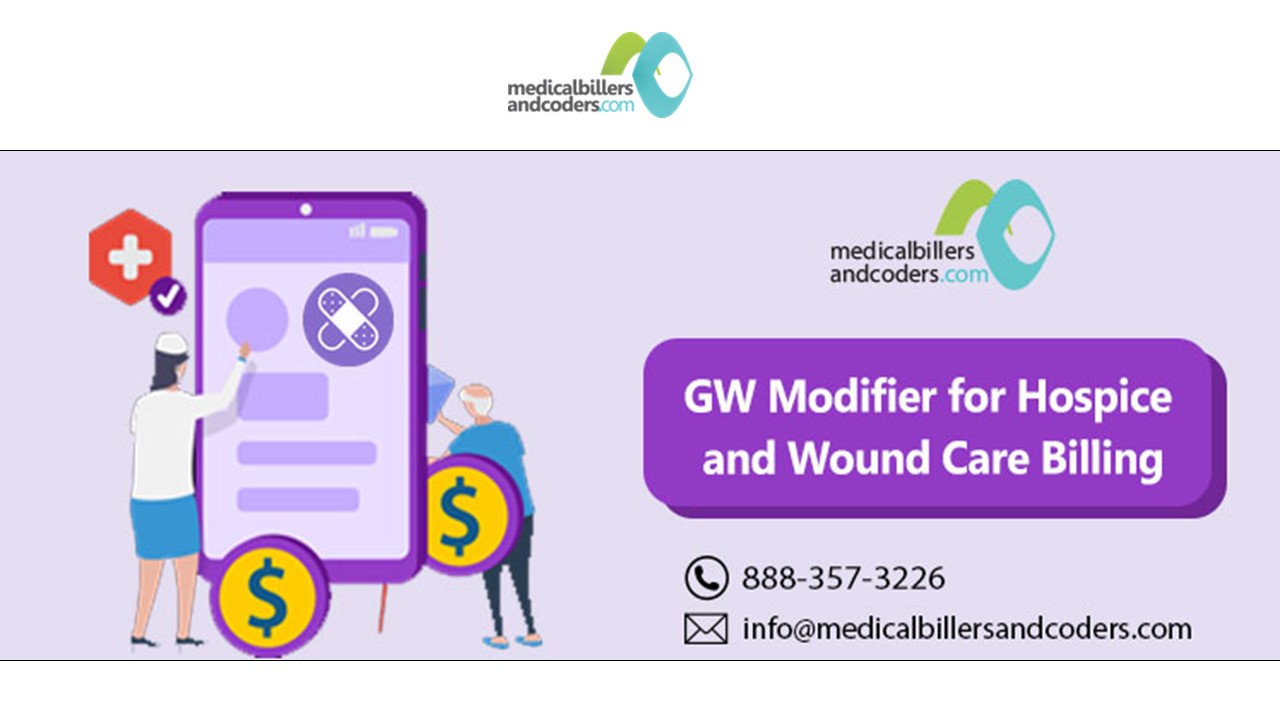GW Modifier for Hospice and Wound Care Billing - PowerPoint PPT Presentation
Title:
GW Modifier for Hospice and Wound Care Billing
Description:
Learn how the GW modifier plays a crucial role in wound care billing for hospice patients, ensuring proper reimbursement for essential services. – PowerPoint PPT presentation
Number of Views:0
Updated: 16 July 2024
Slides: 6
Provided by:
Username withheld or not provided
Category:
Other
Tags:
Title: GW Modifier for Hospice and Wound Care Billing
1
(No Transcript)
2
GW Modifier for Hospice and Wound Care Billing
Hospice care is a specialized type of healthcare
designed to provide comfort and support for
patients who are nearing the end of their lives.
Patients in hospice care often require a range of
medical services, including wound care. To ensure
that hospice patients receive appropriate and
timely wound care, it is important to understand
the use of the GW modifier for hospice. The GW
modifier is a Healthcare Common Procedure Coding
System (HCPCS) modifier that is used to indicate
that a service is related to a patient who is
receiving hospice care for a terminal
illness. This modifier is used in conjunction
with other procedure codes to indicate that the
service was provided to a patient who is in a
hospice program for their terminal illness. When
it comes to wound care billing, the use of the GW
modifier is particularly important. Wound care
is a critical component of hospice care, as many
hospice patients suffer from wounds related to
their terminal illness or from immobility. Wound
care services may include wound assessment,
cleaning, debridement, and dressing changes. To
properly bill for wound care services provided to
hospice patients, healthcare providers must
include the GW modifier on their claim forms.
This modifier serves as an indicator that the
service was related to hospice care and should be
billed accordingly.
3
GW Modifier for Hospice and Wound Care Billing
- Best Practices for Using GW Modifier in Wound
Care Billing - When using the GW modifier in wound care
billing for hospice patients, it is important to
follow these best practices - Ensure that the wound care service is related to
the terminal illness. The GW modifier should only
be used for wound care services that are directly
related to the patients terminal illness. If the
wound care service is not related to the terminal
illness, the GW modifier should not be used.
4
GW Modifier for Hospice and Wound Care Billing
- Include the GW modifier on the claim form. The GW
modifier should be included on the claim form in
conjunction with the appropriate procedure
code(s). This will ensure that the service is
properly identified as related to hospice care. - Follow Medicare guidelines. Medicare provides
guidelines for the use of the GW modifier for
hospice billing, including wound care services.
Healthcare providers should ensure that they are
following Medicare guidelines to avoid claim
denials or audits. - Example of GW Modifier in Wound Care Billing for
Hospice Patients - To illustrate the use of the GW modifier for
hospice patients in wound care billing, consider
the following example - A patient is receiving hospice care for terminal
cancer and requires wound care services for a
pressure ulcer. The wound care provider performs
a wound assessment and dressing change, using the
appropriate procedure codes. - On the claim form, the provider includes the GW
modifier in conjunction with the appropriate
procedure code(s) to indicate that the service
was provided to a patient who is in a hospice
program for their terminal illness.
5
GW Modifier for Hospice and Wound Care Billing
To conclude, the GW modifier is an important tool
for healthcare providers who provide wound care
services to hospice patients. By properly using
the GW modifier in conjunction with appropriate
procedure codes, healthcare providers can ensure
that they are properly billing for services
provided to hospice patients with terminal
illnesses. Following best practices and
guidelines, healthcare providers can avoid claim
denials and audits while providing critical wound
care services to patients in hospice care. If
you need assistance in accurately using the GW
modifier or in wound care billing,
contact Medical Billers and Coders
(MBC) at info_at_medicalbillersandcoders.com/888-357
-3226.































